hankyoreh
Links to other country sites 다른 나라 사이트 링크
Citizens and foreign residents gather to express solidarity with comfort women
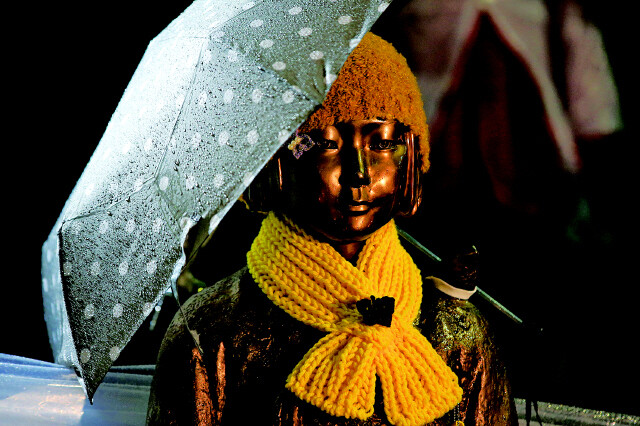
On Dec. 28, the first Wednesday demonstration was held since the governments of South Korea and Japan declared that they had reached an agreement on the issue of the comfort women, who were forced to serve as sex slaves for the Imperial Japanese Army. Given that there was a much bigger turnout than usual in front of the Japanese embassy in Seoul’s Jongno District, the Hankyoreh decided to find out what had brought the participants onto the street.
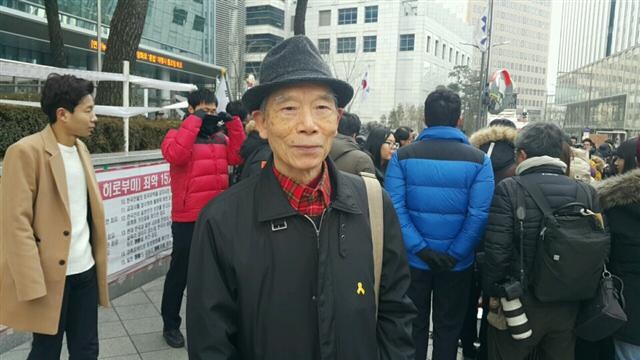
Yun Han-tak, 77, who lived in Sancheong County in South Gyeongsang Province during his youth, vividly remembers when the Japanese army raided his village.
“One day, Japanese forces descended upon the village and went off with the older girls and conscripted the older boys. We were all so frightened that we ran away into Jiri Mountain and didn’t come back to the village until after liberation,” Yun said. When he thinks back to that experience, he feels “anger and humiliation.”
“The statue of the young girl was made so that neither Japan nor our descendants would forget those memories. Japan’s request for the statue’s removal implies that Japan refuses to acknowledge its faults,” he said.
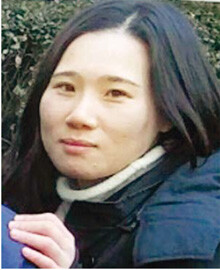
Kang Ye-eun, 28, who teaches history at Suwon High School in Gyeonggi Province, attended the meeting with nine students from a history club.
“When the results of the talks were released, students came to the office and asked me if it was true. While I was teaching the students about the issue of the comfort women this semester, I always taught them that knowing things the right way was better than knowing a lot of things,” Kang said.
“We also studied how the South Korean government has responded. But then the negotiations ended up like this,” she said despondently.
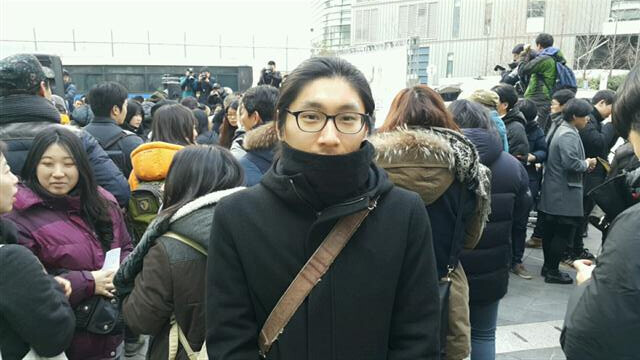
Yoshihiro Wada, a 31-year-old doctoral student in literature who came to Yonsei University three years ago, noted that “conscientious citizens in Japan have also been consistently calling for a sincere apology from Prime Minister Abe.”
“The first thing that got reported [on the talks] in Japan was the part about ‘putting up money.’ But I don’t think money is the issue here,” he added. “I think Abe should apologize now to the comfort women survivors, but I have to wonder if he’s someone with that kind of an understanding of history.”
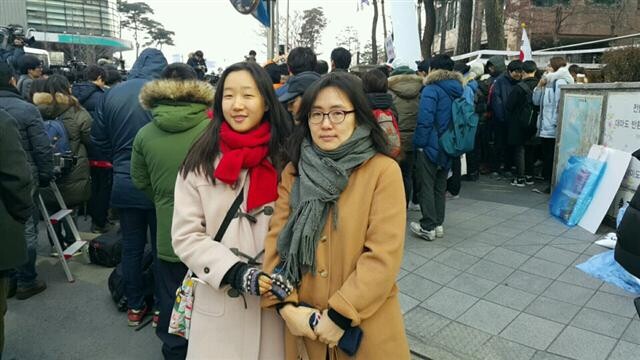
Lee Bo-ra, a 46-year-old mother with a daughter in her third year of middle school, shared her reaction to hearing the results of the talks.
“I wondered why it was that a woman president couldn’t share a deep understanding of the suffering of these women,” Lee said.
“It makes me angry that the President would make such an irresponsible agreement. I don’t think it’s something she could have agreed to if she truly sympathized with the terrible suffering of these women,” she added.
“I think her responsibility now is to keep working toward getting an apology [from Japan] and demanding that it take legal responsibility.”
Daughter Kim Da-in, 15, recalled asking her mother, “Do you mean those women went through all that when they were my age?”
“The comfort women issue is something we’re studying in school right now. There’s the problem that it happened in the first place, and then there’s also the problem that it hasn’t been resolved,” she added.
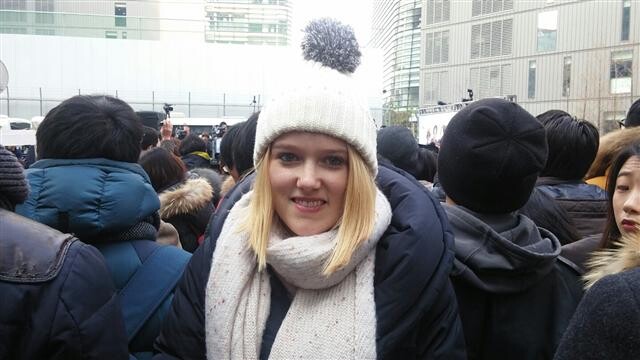
Dec. 30 marked the second visit to a Wednesday demonstration for Cornelia Schmidt, a 23-year-old from Germany who has been studying at Korea University since August. Schmidt, who recalled reading about the comfort women issue in a book two years ago, contrasted Japan’s approach with that of Germany, which has been making consistent efforts to atone for its past misdeeds. In her view, Tokyo has gone about addressing historical issues badly.
“It’s shocking to think that this infringement of women’s human rights and character was conducted systematically at the government level,” Schmidt said.
“The Japanese government should be expressing its heartfelt regrets and remorse to the victims, but you don’t see any of that in these negotiations,” she added.
By Kim Mi-hyang, Kwon Seung-rok, and Ko Han-sol, staff reporters

Editorial・opinion
![[Column] Season 2 of special prosecutor probe may be coming to Korea soon [Column] Season 2 of special prosecutor probe may be coming to Korea soon](https://flexible.img.hani.co.kr/flexible/normal/500/300/imgdb/original/2024/0426/3317141030699447.jpg) [Column] Season 2 of special prosecutor probe may be coming to Korea soon
[Column] Season 2 of special prosecutor probe may be coming to Korea soon![[Column] Park Geun-hye déjà vu in Yoon Suk-yeol [Column] Park Geun-hye déjà vu in Yoon Suk-yeol](https://flexible.img.hani.co.kr/flexible/normal/500/300/imgdb/original/2024/0424/651713945113788.jpg) [Column] Park Geun-hye déjà vu in Yoon Suk-yeol
[Column] Park Geun-hye déjà vu in Yoon Suk-yeol- [Editorial] New weight of N. Korea’s nuclear threats makes dialogue all the more urgent
- [Guest essay] The real reason Korea’s new right wants to dub Rhee a founding father
- [Column] ‘Choson’: Is it time we start referring to N. Korea in its own terms?
- [Editorial] Japan’s rewriting of history with Korea has gone too far
- [Column] The president’s questionable capacity for dialogue
- [Column] Are chaebol firms just pizza pies for families to divvy up as they please?
- [Column] Has Korea, too, crossed the Rubicon on China?
- [Correspondent’s column] In Japan’s alliance with US, echoes of its past alliances with UK
Most viewed articles
- 1No good, very bad game for Korea puts it out of Olympics for first time since 1988
- 2[Column] Season 2 of special prosecutor probe may be coming to Korea soon
- 3Korea’s 1.3% growth in Q1 signals ‘textbook’ return to growth, says government
- 4‘We must say no’: Seoul defense chief on Korean, USFK involvement in hypothetical Taiwan crisis
- 5Is N. Korea threatening to test nukes in response to possible new US-led sanctions body?
- 6Division commander ordered troops to enter raging flood waters before Marine died, survivor says
- 7[Column] ‘Choson’: Is it time we start referring to N. Korea in its own terms?
- 8Will NewJeans end up collateral damage in internal feud at K-pop juggernaut Hybe?
- 9Korea sees more deaths than births for 52nd consecutive month in February
- 10[Editorial] Korea’s surprise Q1 growth requires objective assessment, not blind fanfare